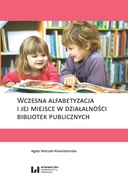Explore

Wczesna alfabetyzacja i jej miejsce w działalności bibliotek publicznych
0 Ungluers have
Faved this Work
Login to Fave
Public libraries have always played a key role in the development of reading, as their mission is perceived to establish areas and contexts for different audiences, creating a connection between families and books. In the case of very small children, including infants, toddlers and preschoolers, it is made even more obvious by the special library sections aimed at early literacy and raising awareness of the value of reading in children’s language development. The subject of this thesis is the broadly understood early literacy of children aged 0-5, conducted within public libraries abroad and in Poland, developed both on the basis of literature on the subject, primarily foreign, and on the basis of own research, carried out within Polish branches of public libraries for children. Its aim is to synthesize current knowledge on the subject, disseminating the concepts and assumptions of early literacy among librarians. The research was carried out in 2018 in the group of 97 branches for children. The services and collections of the researched Polish libraries provide evidence for the implementation of the early literacy assumptions. However, this is still a fairly variable issue, especially considering the two age groups (0-2 and 3-5). Nevertheless, the presence of books addressed to a child who does not read yet (picturebooks, cardboard, pleated, folded and with multimedia addings) is apparent in the collections, the least common in this group are books for babies – from materials other than paper (sponge, foam or fabrics). It is worth emphasizing that the vast majority of the children’s branches in the study offer active forms of working with children aged 0-5, all of which contribute to the development of children’s pre-reading skills to a greater or lesser extent. Shaping the process of early literacy through the work of children’s libraries includes parent education activities. The involvement of libraries can also be observed in cooperation with nurseries and kindergartens, consisting mainly of sessions of reading aloud, library lessons and workshops devoted to early reading, as well as participation in reading projects and distribution of relevant materials. It all adds up to an image of the varied forms and means of work in Polish public children’s libraries for the development of early literacy of children aged 0-5, as well as the education of parents and carers working with this age group.
This book is included in DOAB.
Why read this book? Have your say.
You must be logged in to comment.
Rights Information
Are you the author or publisher of this work? If so, you can claim it as yours by registering as an Unglue.it rights holder.Downloads
This work has been downloaded 25 times via unglue.it ebook links.
- 25 - pdf (CC BY-NC-ND) at Unglue.it.
Keywords
- early education
- early literacy
- family literacy
- pre-reading skills
- public libraries for children
Links
DOI: 10.18778/8142-467-7Editions

